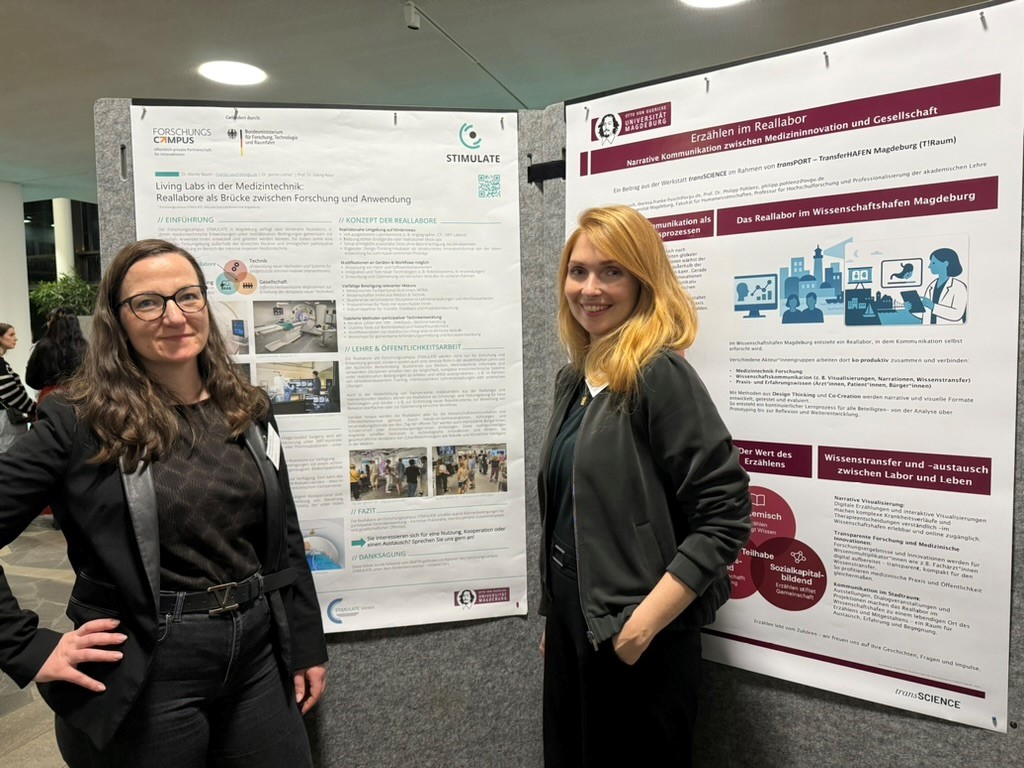NEWS
STIMULATE and transSCIENCE represented at PartWiss25 in Leipzig
From 12 to 14 November 2025, Leipzig hosted the fourth PartWiss Conference – a nationwide conference aimed at strengthening participation in science. Under the theme ‘Researching together – impulses from citizen science, participatory and transdisciplinary research’, it brought together stakeholders from a wide range of disciplines. The Research Campus STIMULATE was represented with two contributions: The Transfer Service Group presented the Campus's participatory medical technology laboratories, while the transSCIENCE workshop of the BMFTR initiative transPORT presented new approaches to dialogical science communication.
Dr Mandy Bauch (Transfer Service Group) presented the clinic-based real-world laboratories under the title ‘Living Labs in Medical Technology’. These enable medical technology innovations to be tested under realistic conditions – for example, in areas such as magnetic resonance imaging or usability research. User feedback from clinics, research and teaching is used to iteratively improve technological developments and adapt them to everyday medical practice.
Theresa Franke-Frysch (transSCIENCE) focused on the role of narrative formats in science and health communication. While clinical real-world laboratories primarily test new therapeutic approaches, the transSCIENCE real-world laboratory focuses on communication and knowledge transfer: formats such as storytelling, dialogue events and visualised disease progression are developed here to make research more accessible to patients, experts and the interested public. This is intended to promote trust, participation and acceptance of medical technology innovations. The transSCIENCE workshop project thus contributes to making the Science Harbour in Magdeburg a place where new forms of exchange become visible, research becomes understandable and curiosity about new developments is aroused.
The conference provided an interdisciplinary framework with contributions on topics such as participatory robot development, the involvement of children and young people in health research, and the participation of patients and practice teams in general medicine. The exchange highlighted the importance of stable infrastructures, methodological diversity and dialogue-based approaches for successful participation processes – especially in medical technology.
STIMULATE und transSCIENCE auf der PartWiss25 in Leipzig vertreten
Vom 12. bis 14. November 2025 fand in Leipzig die vierte PartWiss-Konferenz statt – eine bundesweite Tagung zur Stärkung von Partizipation in der Wissenschaft. Unter dem Leitthema „Gemeinsam forschen – Impulse aus Citizen Science, partizipativer und transdisziplinärer Forschung“ versammelte sie Akteur:innen aus ganz unterschiedlichen Fachbereichen. Der Forschungscampus STIMULATE war mit zwei Beiträgen vertreten: Die Servicegruppe Transfer stellte die partizipativen Medizintechnik-Labore des Campus vor, während die Werkstatt transSCIENCE der BMFTR-Initiative transPORT neue Ansätze für dialogische Wissenschaftskommunikation präsentierte.
Dr. Mandy Bauch (Servicegruppe Transfer) stellte unter dem Titel „Living Labs in der Medizintechnik“ die kliniknahen Reallabore vor. Diese ermöglichen es, medizintechnische Innovationen unter realitätsnahen Bedingungen zu erproben – etwa in Bereichen wie Magnetresonanztomographie oder Usability-Forschung. Durch Nutzerfeedback aus Klinik, Forschung und Lehre werden technologische Entwicklungen iterativ verbessert und an den medizinischen Alltag angepasst.
Theresa Franke-Frysch (transSCIENCE) rückte die Rolle narrativer Formate in der Wissenschafts- und Gesundheitskommunikation in den Fokus. Während klinische Reallabore vor allem neue Therapieansätze erproben, konzentriert sich das Reallabor von transSCIENCE auf Kommunikation und Wissenstransfer: Hier werden Formate wie Storytelling, Dialogveranstaltungen und visualisierte Krankheitsverläufe entwickelt, um Forschung für Patient:innen, Fachkreise und eine interessierte Öffentlichkeit besser zugänglich zu machen. Dies soll Vertrauen, Teilhabe sowie Akzeptanz gegenüber medizintechnischen Innovationen fördern. Das Werkstattprojekt transSCIENCE trägt somit bei, den Wissenschaftshafen in Magdeburg zu einem Ort zu machen, an dem neue Formen des Austauschs sichtbar werden, Forschung verständlich wird und Neugier auf neue Entwicklungen entsteht.
Die Konferenz bot einen interdisziplinären Rahmen mit Beiträgen u. a. zur partizipativen Roboterentwicklung, zur Einbindung von Kindern und Jugendlichen in Gesundheitsforschung sowie zur Beteiligung von Patient:innen und Praxisteams in der Allgemeinmedizin. Der Austausch zeigte, wie wichtig stabile Infrastrukturen, methodische Vielfalt und dialogische Ansätze für erfolgreiche Partizipationsprozesse sind – auch und gerade in der Medizintechnik.